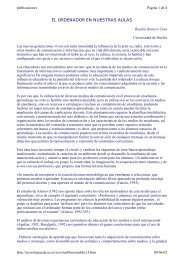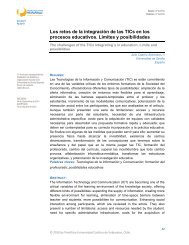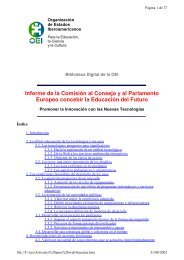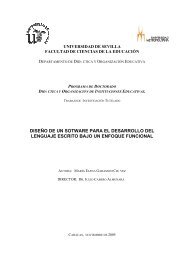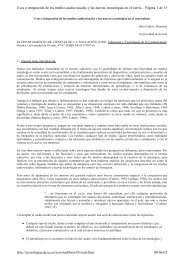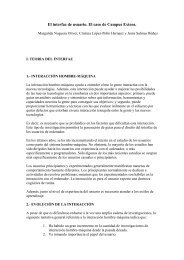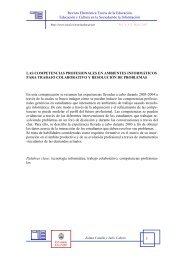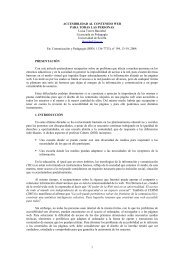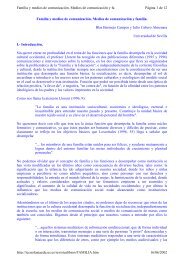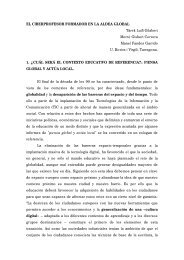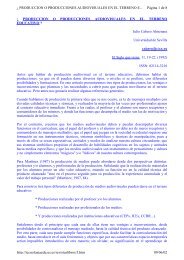The relevance of video games and gaming consoles to the Higher ...
The relevance of video games and gaming consoles to the Higher ...
The relevance of video games and gaming consoles to the Higher ...
You also want an ePaper? Increase the reach of your titles
YUMPU automatically turns print PDFs into web optimized ePapers that Google loves.
4. Benefits <strong>of</strong> <strong>games</strong> <strong>and</strong> <strong>gaming</strong> <strong>consoles</strong> <strong>to</strong> learning4.1 benefits <strong>of</strong> <strong>games</strong><strong>The</strong>re are a number <strong>of</strong> small-scale investigations <strong>and</strong> commentaries e.g. [CMS] [TEC] concerningpotential <strong>and</strong> actual benefits <strong>of</strong> <strong>video</strong> <strong>games</strong> in education. One study <strong>of</strong> particular interest <strong>to</strong> <strong>the</strong> UKis <strong>the</strong> Computer Games in Education project funded by BECTA [BECTA], where six computer<strong>games</strong> were used in <strong>the</strong> classroom <strong>to</strong> support National Curriculum learning. <strong>The</strong> study found that:“…<strong>The</strong> over-riding appeal <strong>of</strong> <strong>the</strong> <strong>games</strong> in lessons was <strong>the</strong> way in which learningopportunities <strong>and</strong> skills were presented in <strong>the</strong> context <strong>of</strong> a situation attractive <strong>to</strong>young people. Championship Manager presented opportunities in <strong>the</strong> context <strong>of</strong>football, Age <strong>of</strong> Empires gave children control <strong>of</strong> cities <strong>and</strong> armies <strong>and</strong> <strong>The</strong> Simsallowed learners <strong>to</strong> build <strong>and</strong> furnish <strong>the</strong>ir own houses. This combination <strong>of</strong>interactivity with a familiar <strong>and</strong> yet novel situation, with clear <strong>and</strong> agreed aims forlearning, seemed <strong>to</strong> be very effective.”Though <strong>the</strong> study involved a relatively small number <strong>of</strong> <strong>games</strong>, it was able <strong>to</strong> derive a number <strong>of</strong>conclusions:?? <strong>the</strong> role <strong>of</strong> <strong>the</strong> teacher in structuring <strong>and</strong> framing <strong>the</strong> activity <strong>of</strong> <strong>the</strong> learner remains crucial iflearning outcomes are <strong>to</strong> be achieved. <strong>The</strong> teacher wishing <strong>to</strong> use <strong>games</strong> must know what kind<strong>of</strong> content particular titles <strong>of</strong>fer. Also, <strong>the</strong> teacher requires some underst<strong>and</strong>ing <strong>of</strong> <strong>the</strong> controls,menus <strong>and</strong> skill levels <strong>of</strong> <strong>the</strong> game in order <strong>to</strong> use it effectively.?? for some <strong>games</strong> <strong>and</strong> school contexts, working with specific <strong>and</strong> relevant elements or sections <strong>of</strong><strong>the</strong> game may be more useful than using <strong>the</strong> game as a whole.?? simulation <strong>games</strong> can <strong>of</strong>fer learners sophisticated scenarios <strong>to</strong> support meaningful post-gamediscussion.?? an imaginative <strong>and</strong> well-produced game may be flexible <strong>and</strong> complex enough <strong>to</strong> <strong>of</strong>fer a range <strong>of</strong>educational opportunities.?? teachers in <strong>the</strong> study found that use <strong>of</strong> <strong>the</strong> <strong>games</strong> could provide motivation, develop skills <strong>and</strong>encourage collaboration.?? <strong>games</strong> have a significant advantage in that pupils receive immediate feedback on <strong>the</strong>ir actions<strong>and</strong> decisions, inviting exploration <strong>and</strong> experimentation.Overall, <strong>the</strong>re were obvious benefits <strong>to</strong> <strong>the</strong> use <strong>of</strong> components <strong>of</strong> <strong>video</strong> <strong>games</strong> that were relevant <strong>to</strong><strong>the</strong> <strong>to</strong>pic being taught. However, <strong>the</strong> workload <strong>of</strong> <strong>the</strong> teacher is significantly increased, as gameevaluation, familiarity <strong>and</strong> objective planning is required.Fur<strong>the</strong>r research by BECTA has resulted in <strong>the</strong> identification <strong>of</strong> scenarios where <strong>games</strong> cancontribute <strong>to</strong>wards learning skill development, in addition <strong>to</strong> guidelines for capitalising on learningopportunities within <strong>games</strong> [BECTA infosheet].O<strong>the</strong>r studies point <strong>to</strong> computer <strong>and</strong> <strong>video</strong> <strong>games</strong> providing a range <strong>of</strong> benefits, though manyindicate that <strong>the</strong>se only occur when a game is used in a relevant context <strong>to</strong> <strong>the</strong> learning activity orgoal. <strong>The</strong>se benefits include:?? at <strong>the</strong> most basic level (<strong>and</strong> over-quoted in <strong>the</strong> media), game players developing h<strong>and</strong>-eyecoordination.?? <strong>the</strong> development <strong>of</strong> strategic skills, through playing contemporary <strong>games</strong> which are increasinglycomplex <strong>and</strong> non-linear.?? (against <strong>the</strong> stereotype <strong>of</strong> <strong>gaming</strong> as a socially isolating action) <strong>the</strong> development <strong>of</strong> team,social, communication <strong>and</strong> resource sharing skills through <strong>the</strong> playing <strong>of</strong> multi-player <strong>and</strong>(user) team-oriented <strong>games</strong> <strong>and</strong> simulations.?? stimulating curiosity <strong>and</strong> encouraging experimentation in a safe “virtual” environment.




